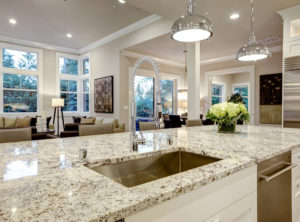 There are pros and cons to all types of stone countertops. How do you choose which ones are best for your home? Knowing the properties of each type of stone will help you make the right decision.
There are pros and cons to all types of stone countertops. How do you choose which ones are best for your home? Knowing the properties of each type of stone will help you make the right decision.
Granite – There are over 3,000 types of granite. Despite its strength, granite is porous, which means it can absorb stains unless it’s sealed. It can crack if not properly fabricated and installed. Yet, granite’s beauty and variety make it the most popular choice for countertops.
Soapstone – Soapstone is a “magnesium-rich metamorphic rock” containing up to 80% talc, making it ideal for carving. However, there is a stronger strain called architectural soapstone that is impervious to staining and scorching. Damage can be sanded out. It requires no sealant, but mineral oil helps develop its patina, which darkens with age.
Marble – Marble is one of the most beautiful stones and is frequently used as in small amounts such as a bathroom countertop. It stains and scratches easily and requires sealant, making it less popular for kitchens. Like granite, it adds value to the home.
Quartz – Engineered stone is man-made of approximately 93% quartz and the remainder in resins. Developed as an alternative to granite, it’s nearly as expensive, but performs much better. While granite, soapstone and marble feature artistic veining and natural “flaws,” quartz is manufactured to have uniform patterns and colors. The advantage is a surface that requires no sealant that’s more durable and scratch resistant than natural stone.